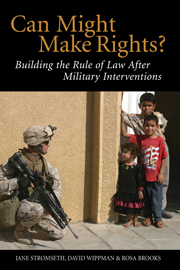Book contents
- Frontmatter
- Contents
- Acknowledgments
- 1 Introduction: A New Imperialism?
- 2 Interventions and International Law: Legality and Legitimacy
- 3 What Is the Rule of Law?: A Pragmatic Definition and a Synergistic Approach
- 4 Blueprints for Post-Conflict Governance
- 5 Security as Sine Qua Non
- 6 The Challenge of Justice System Reform
- 7 Accountability for Atrocities: Moving Forward by Looking Backward?
- 8 Creating Rule of Law Cultures
- 9 Enhancing Rule of Law Efforts: Planning, Funding, and Local Ownership
- 10 Conclusion
- Index
6 - The Challenge of Justice System Reform
Published online by Cambridge University Press: 05 June 2012
- Frontmatter
- Contents
- Acknowledgments
- 1 Introduction: A New Imperialism?
- 2 Interventions and International Law: Legality and Legitimacy
- 3 What Is the Rule of Law?: A Pragmatic Definition and a Synergistic Approach
- 4 Blueprints for Post-Conflict Governance
- 5 Security as Sine Qua Non
- 6 The Challenge of Justice System Reform
- 7 Accountability for Atrocities: Moving Forward by Looking Backward?
- 8 Creating Rule of Law Cultures
- 9 Enhancing Rule of Law Efforts: Planning, Funding, and Local Ownership
- 10 Conclusion
- Index
Summary
As we argued in earlier chapters, building the rule of law requires not only basic security and functioning institutions but also a strong degree of public support and confidence. People need to know that they can resolve disputes without resorting to violence, that the law will protect them from abusive government officials and predatory nonstate actors alike, and that their fundamental rights will be secure. But for people to have good reason for confidence in the rule of law as a cultural matter, we also emphasized the need for laws and law-making processes that enjoy legitimacy, for legal institutions that function fairly, and for a government that is prepared to be bound by law. Strengthening the rule of law, in short, is both a practical project of institution-building and a cultural project of shaping attitudes and commitments.
This chapter examines one piece of this mosaic: building fair, effective justice systems in the wake of military interventions. Beyond the immediate task of establishing security, longer-term efforts to strengthen a country's justice system – including its courts, police, and prisons – are a vital part of building the rule of law after intervention. In countries as diverse as Afghanistan, Iraq, East Timor, Kosovo, Bosnia, Haiti, and Sierra Leone, among others, interveners have worked with local leaders to recruit and train police, appoint and train judges, build and furnish courthouses, and improve often deplorable prison conditions.
- Type
- Chapter
- Information
- Can Might Make Rights?Building the Rule of Law after Military Interventions, pp. 178 - 248Publisher: Cambridge University PressPrint publication year: 2006



